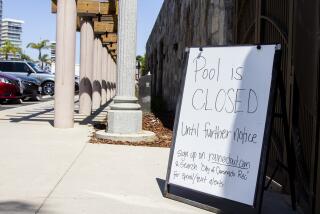Pools Can Be Kept Up Using Alternatives to Basic Chlorine
- Share via
A large part of pool maintenance is maintaining purity of the water--usually by adding chlorine. The most common method of testing chlorine content is by taking a sample of the water, adding a few drops of reagent and comparing the color to a graduated color chart.
Though this method is still the most popular, electronic probes are now on the market that do all the work for you, without the mess. One such product is the Electro-Tester, which retails for about $40 and is made by World Industries International.
You do, however, have some alternatives to chlorine treatment. Here are three:
* Ozone has long been used in purifying drinking water, so it stands to reason that it might work in swimming pools as well. Because ozone has little residual--it reverts to oxygen--some chlorine is still needed, but the reduction in chlorine is said to approach 90%, which is quite a savings.
Ozone does require a balanced pH, however. The equipment--a small, electrified cartridge spliced into the piping--is easily installed on new pools and just as easily retrofitted to existing pools; prices start about $350.
* Another reduced-chemical approach uses electrolytic ion exchanges to strip microorganisms of their sustaining atomic structures.
Ionization, like the ozone treatment method, also requires management of the water’s pH balance, plus enough chlorine to sustain a 0.4 parts-per-million residual. Electrolytic ionizers for pools start at about $900.
* A final category of purification equipment is able to convert common table salt (sodium chloride) into chlorine in a way that allows the chlorine to revert back to salt when its work is done.
Chlorine production is a simple process--usually consisting of passing electricity through an in-line chamber containing sodium and water. The electrical charge causes the chemical components to separate and realign. One of the resulting byproducts is chlorine, which is the basis of most pool chemistry products.
Unlike regular chlorine additives, though, this treatment is said to be strong enough to eliminate the need for heavy, chlorine shock treatments.
And this process should be welcomed by many because the spent chlorine reverts to salt, and does not linger as chloramine leftovers ready to assault eyes, skin and hair. A chlorine generator for a backyard pool should start about $350.
World Industries International, 17955 Arenth Ave., City of Industry, CA 91748; (800) 535-POOL.
More to Read
Inside the business of entertainment
The Wide Shot brings you news, analysis and insights on everything from streaming wars to production — and what it all means for the future.
You may occasionally receive promotional content from the Los Angeles Times.









